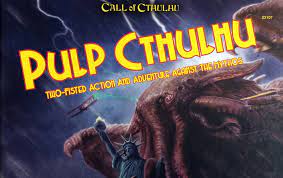
H. P. Lovecraft and Robert E. Howard co-wrote a story. Lovecraft’s section ended with the protagonist learning a truth about the Cthulhu Mythos and promptly passing out. Howard picked the story up with the protagonist regaining his senses and charging to face the horrors of the Mythos.
 Lovecraft’s style depicts the classic approach to running Call of Cthulhu. The monsters of the Mythos are so terrifying the characters can’t help but go insane or pass out from fear. In Pulp Cthulhu, an alternative way to run Call of Cthulhu, the characters are made of tougher stuff, don’t lose their wits as often and have a fighting chance against many of the Mythos monsters… not great Cthulhu to say, but many of the beasts that would cause a TPK in a classic game.
Lovecraft’s style depicts the classic approach to running Call of Cthulhu. The monsters of the Mythos are so terrifying the characters can’t help but go insane or pass out from fear. In Pulp Cthulhu, an alternative way to run Call of Cthulhu, the characters are made of tougher stuff, don’t lose their wits as often and have a fighting chance against many of the Mythos monsters… not great Cthulhu to say, but many of the beasts that would cause a TPK in a classic game.
The difference is even in the name given to the PCs. In classic Call of Cthulhu, the heroes are called Investigators. They follow clues left behind by cultists until they find a nugget of cosmic truth and get themselves over their heads. They do their best to stop their human opponents but otherwise run away from the monsters of the Mythos.
In pulp Call of Cthulhu, the PCs are called Heroes. They get knocked around by Mythos monsters, fall off ledges that would break an Investigator’s leg and make him pass out from the pain. They kick down the door and face the cultists with two-fisted action.
Pulp Cthulhu Heroes make use of the Luck rules. If a role is failed, Luck can be spent on a point by point basis to bring the rolled number down to a success. Luck can be spent to cancel a Malfunction on a weapon roll. It can be spent to halve the amount of Sanity lost. Most appropriate to the style of the stories, it keeps Heroes from getting knocked unconscious.
Luck can do very cool things like turn a lethal attack into “just a scratch.”
All the Luck points can be spent to prevent death from an instant kill situation.
This isn’t one-sided. The non-mook characters in the game also get access to Luck. Unlike with Heroes, Luck can let a villain make a second attack… or to have a mook suffer the damage instead of the main villain.
The latest campaign release from Chaosium, A Time to Harvest, is designed to handle both styles of play. The first few chapters might feel weird using pulp rules. The characters are typical students from Miskatonic University or hired employs of Federated Oil and Chemical on a field trip to the hills of southern Vermont.
These aren’t masked avengers or femme fatales from the pages of pulp action magazines.
However, as the story progresses, the fight turns against the monsters of the Mythos. This is where pulp style really shines, going room to room through the monsters’ lair, discovering weird science the characters might be brave or foolhardy enough to try to use themselves.
Finally, the adventure has an optional final chapter custom made for pulp play, where the characters invade a monster lair on the moon’s surface. This is right out of the works of Robert. E. Howard and his contemporaries. It makes sense these heroes would be made of sterner stuff than the typical geology students attending a field trip.’
I would advise dividing the campaign in half, starting with classic Call of Cthulhu play, where the investigators are typical students way over their heads. Then, once the characters start acting like Rambo and going after the Mythos creatures, the style should turn to pulp.
Using the pregens in the book can still be done. The pregen sheets provide insight on how to turn the classic pregen Investigators into pulp Heroes.
The classic and pulp styles of Call of Cthulhu have a lot to offer, although there’s a world of difference in their execution. Groups should experiment by playing modules in both styles.
